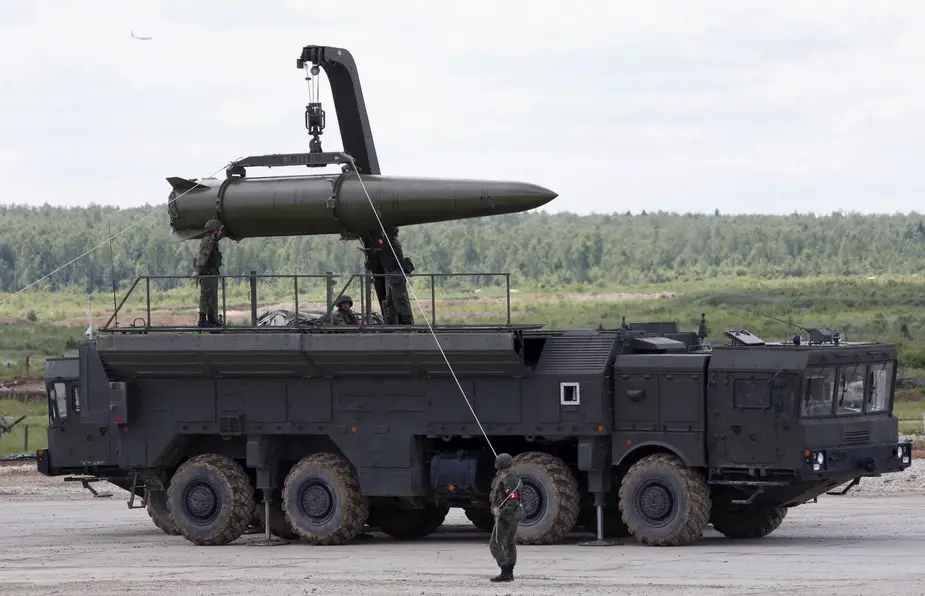Breaking news
Russia rejects U.S. demands on 9M729 Iskander cruise missile.
Russia has rejected the U.S. demand for the elimination of the 9M729 Iskander cruise missile, as the two countries continue a spat over the Intermediate-range Nuclear Forces (INF) Treaty(*).

9M729 Iskander cruise missile (Picture source: Russian MoD)
Speaking at a briefing on the 9M729 Iskander cruise missile, Deputy Foreign Minister Sergei Ryabkov said, "The US delegation arrived in Geneva for inter-departmental consultations over the INF Treaty with the sole purpose: to read out statements written in advance to the effect that Russia rejects the ultimatum demanding our unilateral concessions implying verifiable elimination of all 9M729 missiles, their launchers and related equipment." He added, "Naturally, this kind of approach by no means looks like a diligent attempt at achieving a solution that would suit both sides and is absolutely unacceptable for us in gist and content."
The U.S. and the Soviet Union signed the INF Treaty in 1987 and have remained compliant with its terms thereafter. The treaty eliminated ground-based launchers and missiles with ranges from 500 kilometers to 5,500 kilometers. However, in recent years, the U.S. has claimed that a Russian missile under development is in violation of the treaty. According to the U.S., the Russian military flight-tested the 9M729 Iskander cruise missile to a distance "well over" 500 kilometers from a fixed launcher -- which is permissible under the agreement provided that the intention is to deploy the weapon at sea -- and to distances under 500 kilometers from mobile launchers. The two of these types of tests together, Washington claims, violates the INF Treaty's provisions as they indicate the system is for use on a ground-based launcher. The U.S. has threatened to withdraw from the treaty in response and currently plans to leave on February 2, 2019.
On January 23, 2019, the Russian Defense and Foreign ministries jointly put on a briefing for foreign military attaches, displaying the Iskander missile as well as its purported specifications. The missile was said to have a range of 480 kilometers, which is 10 kilometers less than the previous version, 9M728.
Earlier in the week, the U.S. called on Russia to destroy the 9M729, but Moscow has thus far rejected the demands. The Russian government denies violating the INF Treaty and has urged the U.S. to negotiate on the matter. Deputy Foreign Minister Ryabkov noted, "The treaty needs to be preserved. It is up to the American side to make the choice." The negotiations "should be done with the mandatory mutual consideration of both parties’ interests and concerns and without any counterproductive ultimatums," Ryabkov stressed.
(*) The Intermediate-Range Nuclear Forces Treaty (INF Treaty, formally Treaty Between the United States of America and the Union of Soviet Socialist Republics on the Elimination of Their Intermediate-Range and Shorter-Range Missiles) is a 1987 arms control agreement between the United States and the Soviet Union (and later its successor state the Russian Federation). Signed in Washington, D.C. by President Ronald Reagan and General Secretary Mikhail Gorbachev on 8 December 1987, the treaty was ratified by the United States Senate on 27 May 1988 and came into force on 1 June 1988.
The INF Treaty eliminated all nuclear and conventional missiles, as well as their launchers, with ranges of 500–1,000 kilometers (310–620 miles) (short-range) and 1,000–5,500 km (620–3,420 miles) (intermediate-range). The treaty did not cover sea-launched missiles. By May 1991, 2,692 missiles were eliminated, followed by 10 years of on-site verification inspections.
On 20 October 2018, citing Russian non-compliance, US President Donald Trump announced that he was withdrawing the US from the treaty. Numerous prominent nuclear arms control experts, including George Shultz, Richard Lugar and Sam Nunn, urged Trump to preserve the treaty. Russian president Vladimir Putin announced on 20 November 2018 that the Kremlin was prepared to discuss INF with Washington but would "retaliate" if the United States withdrew.


























